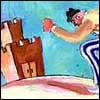Dear Reader,
Are you feeling drained, stressed, constantly exhausted, and not appreciated? Are you feeling unfulfilled in your goals and dreams?
You may just need to learn how to set firmer boundaries in your life.
Personal boundaries are physical, emotional, spiritual, or relational limits that define us as separate from others. Setting boundaries means that instead of taking on other people’s beliefs, standards, and feelings, we become in tune with our own. We learn to develop a more solid sense of self that helps us take control of what is important to us and make decisions that serve our value system.
We all need boundaries in our lives. They help us define ourselves, nurture our well-being, and empower us to more accurately navigate our life’s journeys. Boundaries need regular maintenance, and there are times when we actively need to defend our boundaries against intrusion.
Matot has the double meaning of being a line or branch, as well as a tribe. Matot are those branches of wood that are cut off from the tree that have hardened. Similarly, matot also refers to the tribes who have developed into their own distinctive groups. The portion of Matot begins with Moses speaking to the heads of these tribes.
Massei, on the other hand, means journeys, and recounts the journeys of the Jewish people from Egypt to the Promised Land.
Part of growing and maturing into our own independent, distinctive self is finding our backbone, knowing our principles and parameters.
We need to know where to draw our line, when to say a firm and unyielding, “No! This is not who I am or who I want to be.” We need to distinguish between what is helping us get closer to our “Promised Land,” and what is just serving as distractions or detours.
The portions of Matot and Massei are always read during the Three Weeks, the time period from the 17th of Tammuz until the ninth of Av, when we mourn the destruction of the Temple and the onset of our exile.
Exile is not only about being forced to leave our land; it is also about being in a state of moral and spiritual displacement and rootlessness. Exile is about being thrown into a world where values and morals are so ephemeral that they get swept away with the wind and change with every new whim or societal trend.
As we journey through our national exile—just as we search for direction along the path of our unique personal journey—we need to define resilient boundaries.
When ethical and personal parameters keep blurring, it’s time for us to take out our metaphorical markers and draw definitive lines.
Chana Weisberg
Editor, TJW






